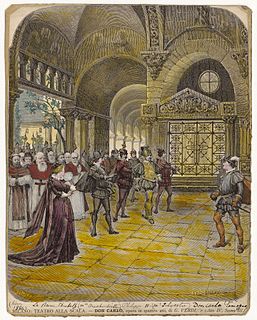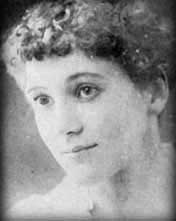Related Research Articles

William Butler Yeats was an Irish poet and one of the foremost figures of 20th-century literature. A pillar of the Irish literary establishment, he helped to found the Abbey Theatre, and in his later years served two terms as a Senator of the Irish Free State. He was a driving force behind the Irish Literary Revival along with Lady Gregory, Edward Martyn and others.

Don Carlos is a five-act grand opera composed by Giuseppe Verdi to a French-language libretto by Joseph Méry and Camille du Locle, based on the dramatic play Don Carlos, Infant von Spanien by Friedrich Schiller. In addition, it has been noted by David Kimball that the Fontainebleau scene and auto-da-fé were the most substantial of several incidents borrowed from a contemporary play on Philip II by Eugène Cormon". The opera is most often performed in Italian translation, usually under the title Don Carlo.

John Butler Yeats was an Irish artist and the father of William Butler Yeats, Lily Yeats, Elizabeth Corbett "Lolly" Yeats and Jack B. Yeats. The National Gallery of Ireland holds a number of his portraits in oil and works on paper, including one of his portraits of his son William, painted in 1900. His portrait of John O'Leary (1904) is considered his masterpiece.

The Abbey Theatre, also known as the National Theatre of Ireland, in Dublin, Ireland, is one of the country's leading cultural institutions. First opening to the public on 27 December 1904, and despite losing its original building to a fire in 1951, it has remained active to the present day. The Abbey was the first state-subsidized theatre in the English-speaking world; from 1925 onwards it received an annual subsidy from the Irish Free State. Since July 1966, the Abbey has been located at 26 Lower Abbey Street, Dublin 1.

"Her Pilgrim Soul" is the first segment of the twelfth episode from the first season (1985–86) of the television series The Twilight Zone.

Katharine Tynan was an Irish writer, known mainly for her novels and poetry. After her marriage in 1898 to the English writer and barrister Henry Albert Hinkson (1865–1919) she usually wrote under the name Katharine Tynan Hinkson, or variations thereof. Of their three children, Pamela Hinkson (1900–1982) was also known as a writer.

Susan Mary "Lily" Yeats was an embroiderer associated with the Celtic Revival. In 1908 she founded the embroidery department of Cuala Industries, with which she was involved until its dissolution in 1931. She is known for her embroidered pictures.
Anne Butler Yeats was an Irish painter, costume and stage designer. She was a daughter of the poet William Butler Yeats and Georgie Hyde-Lees, a niece of the painter Jack B. Yeats, and of Lily Yeats and of Elizabeth Corbet Yeats. Her aunts were associated with the arts and crafts movement in Ireland and were associated with the Dun Emer Press, Cuala Press, and Dun Emer industries. Her brother Michael Yeats was a politician. She was known as "feathers" by her family

Kathleen Ni Houlihan is a mythical symbol and emblem of Irish nationalism found in literature and art, sometimes representing Ireland as a personified woman. The figure of Kathleen Ni Houlihan has also been invoked in nationalist Irish politics. Kathleen Ni Houlihan is sometimes spelled as Cathleen Ni Houlihan, and the figure is also sometimes referred to as the Sean-Bhean Bhocht, the Poor Old Woman, and similar appellations. Kathleen Ni Houlihan is generally depicted as an old woman who needs the help of young Irish men willing to fight and die to free Ireland from colonial rule, usually resulting in the young men becoming martyrs for this cause. In the days before the Anglo-Irish War, the colonial power was the United Kingdom of Great Britain and Ireland. After the Anglo-Irish War, Kathleen Ni Houlihan was a figure more associated with the Irish Republican Army in Northern Ireland, especially during the Troubles.
Deirdre of the Sorrows is a three-act play written by Irish playwright John Millington Synge, first performed at the Abbey Theatre by the Irish National Theatre Society in 1910. The play is based on Irish mythology, in particular the myths concerning Deirdre, Naoise, and Conchobar. The work was unfinished at the author's death in 1909, but was completed by William Butler Yeats and Synge's fiancée, Molly Allgood.

Florence Beatrice Emery (née) Farr was a British West End leading actress, composer and director. She was also a women's rights activist, journalist, educator, singer, novelist, and leader of the occult order, the Hermetic Order of the Golden Dawn. She was a friend and collaborator of Nobel laureate William Butler Yeats, poet Ezra Pound, playwright Oscar Wilde, artists Aubrey Beardsley and Pamela Colman Smith, Masonic scholar Arthur Edward Waite, theatrical producer Annie Horniman, and many other literati of London's Fin de siècle era, and even by their standards she was "the bohemian's bohemian". Though not as well known as some of her contemporaries and successors, Farr was a "First Wave" Feminist of the late 19th and early 20th centuries; she publicly advocated for suffrage, workplace equality, and equal protection under the law for women, writing a book and many articles in intellectual journals on the rights of "the modern woman".

The Name of the Rose is a 1986 Italian-French-German mystery historical drama film directed by Jean-Jacques Annaud, based on the novel of the same name by Umberto Eco. Sean Connery stars as the Franciscan friar William of Baskerville, called upon to solve a deadly mystery in a medieval abbey, and Christian Slater is his apprentice Adso of Melk.
The Countess Cathleen is a verse drama by William Butler Yeats in blank verse. It was dedicated to Maud Gonne, the object of his affections for many years.
At the Hawk's Well is a one-act play by William Butler Yeats, first performed in 1916 and published in 1917. It is one of five plays by Yeats which are loosely based on the stories of Cuchulain the mythological hero of ancient Ulster. It was the first play written in English that utilised many of the features of the Japanese Noh Theatre.
This is a list of all works by Irish poet and dramatist W. B. Yeats (1865–1939), winner of the 1923 Nobel Prize in Literature and a foremost figure in 20th-century literature. Works sometimes appear twice if parts of new editions or significantly revised. Posthumous editions are also included if they are the first publication of a new or significantly revised work. Years are linked to corresponding "[year] in poetry" articles for works of poetry, and "[year] in literature" articles for other works.
Iseult Lucille Germaine Gonne was the daughter of Maud Gonne and Lucien Millevoye, and the wife of the novelist Francis Stuart.
Purgatory is a drama by the Irish writer William Butler Yeats. It was first presented in at the Abbey Theatre, Dublin, on 19 August 1938, a few months before Yeats' death.
Christian Lapointe is a Canadian theatre director from Quebec.

Olivia Shakespear was a British novelist, playwright, and patron of the arts. She wrote six books that are described as "marriage problem" novels. Her works sold poorly, sometimes only a few hundred copies. Her last novel, Uncle Hilary, is considered her best. She wrote two plays in collaboration with Florence Farr.
According to some literary and religious studies scholars, modern Theosophy had a certain influence on contemporary literature, particularly in forms of genre fiction such as fantasy and science fiction. Researchers claim that Theosophy has significantly influenced the Irish literary renaissance of the late 19th and early 20th centuries, notably in such figures as W. B. Yeats and G. W. Russell.
References
- ↑ Yeats (2003).